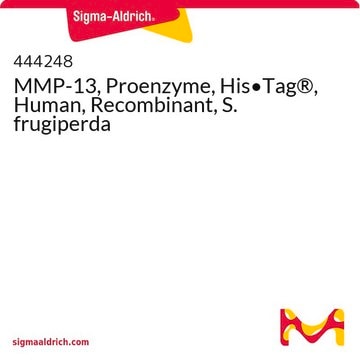408700
Poly(ethyleneimine) solution
average Mw 1800, 50 wt. % in H2O
Synonym(s):
Ethyleneimine polymer solution, PEI
About This Item
Recommended Products
form
liquid
Quality Level
mol wt
average Mw 1800
concentration
50 wt. % in H2O
refractive index
n20/D 1.453
density
1.08 g/mL at 25 °C
InChI
1S/C2H8N2.C2H5N/c3-1-2-4;1-2-3-1/h1-4H2;3H,1-2H2
InChI key
SFLOAOINZSFFAE-UHFFFAOYSA-N
General description
Application
It can be used as a precursor to prepare polyelectrolyte multilayers for the promotion of cell adhesion and growth on implant surfaces.
PEI can act as a reactive template and stabilizing agent in the preparation of metal nanoparticles in aqueous media. The amino groups in the PEI can coordinate with metal ions dissolved in water and reduce their aggregation capability. This results in the formation of smaller nanoparticles.
Features and Benefits
- It has repetitive structural units and aflexible polymer chain.
- Due to the accessibility of a huge number ofamino groups on PEI, it can be modified or functionalized for specific featuressuch as sensitivity, specificity, and biocompatibility.
- Highwater solubility.
Physical form
Signal Word
Warning
Hazard Statements
Precautionary Statements
Hazard Classifications
Aquatic Chronic 2 - Skin Sens. 1
Storage Class Code
10 - Combustible liquids
WGK
WGK 2
Certificates of Analysis (COA)
Search for Certificates of Analysis (COA) by entering the products Lot/Batch Number. Lot and Batch Numbers can be found on a product’s label following the words ‘Lot’ or ‘Batch’.
Already Own This Product?
Find documentation for the products that you have recently purchased in the Document Library.
Customers Also Viewed
Articles
Gene therapy has become one of the most discussed techniques in biomedical research in recent years.
We present an article that discusses two applications in particular; first, using these layers as polyelectrolyte membranes to control permeability.
Microfluidic assembly improves polyamine nanoencapsulation of nucleic acids, overcoming challenges like polydispersity and poor reproducibility.
Microfluidic assembly improves polyamine nanoencapsulation of nucleic acids, overcoming challenges like polydispersity and poor reproducibility.
Our team of scientists has experience in all areas of research including Life Science, Material Science, Chemical Synthesis, Chromatography, Analytical and many others.
Contact Technical Service










